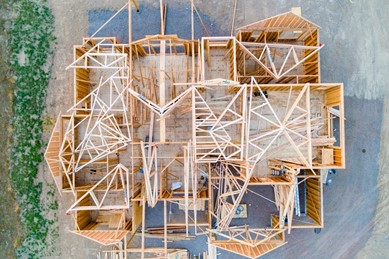 Photo Provided Courtesy of Unsplash.com
Photo Provided Courtesy of Unsplash.com
The Use of Drones in the Home Inspection Industry – How Close is Too Close?
By Elizabeth Fitch, Feature Editor
Drones, or unmanned aerial vehicles (UAVs), are small aircrafts, often equipped with cameras, that have gained significant popularity both commercially and recreationally in recent years because of their aerial photographic ability.[1] These picture and video capabilities have launched drones into the real estate market as a safer way to conduct home and building inspections.[2] However, this novel technology does not come without barriers.[3] Operating a drone recklessly or flying in restricted airspace, such as near a sports stadium or an airport, could result in excessive fines and serious criminal penalties.[4] Inconsistent overlap between federal laws and local regulations create challenges for operators.[5] Additionally, one of the more prevalent concerns for the public at large is privacy and the legal limits associated with flying a camera over one’s privately-owned space.[6]
With these privacy concerns in mind, why use drones at all? For building inspectors in the residential or commercial real estate business, the capacity to safely, efficiently, and quickly access clear photographic data about the condition of a building’s exterior adds indispensable value to the industry.[7] Drones make it possible to inspect building exteriors that would otherwise be inaccessible to a human, such as an unseen danger of falling debris, a roof that is too high, too steep, or too wet to access safely by foot.[8] “[A drone] is not a toy, it is a tool,” Brooklyn Borough President Eric Adams stated during a proposal to legalize the use of drones for facade inspections after an architect was killed just last year by falling debris in Manhattan.[9] “These tools will save millions of dollars, save time, but most importantly it could actually save lives.”[10] New York City law currently makes flying drones in the city illegal, in part because of the controversy that still surrounds the unmanned vehicles.[11] However, the proposed bill would embrace the technology in order to improve the safety of people in the city, as well as speed up the inspection process for everybody from large corporate operations to residential home buyers.[12]
While the standard use of drone footage in the real estate industry could make transactions safer, faster, more efficient, and more reliable, many still express apprehension regarding drones and privacy laws. After all, how would you feel if a drone flew over your house while you were in your privately owned, fenced-in backyard with your children? Or if it flew by your 40th floor New York City apartment bathroom window? Some individuals may express more concern about certain situations than others, but they are valid in their concern nonetheless. It is also important to keep in mind that in some areas, in addition to federal and local regulations, common law principles may still apply, which means flying a drone over someone’s home may be considered trespass.[13]
Unfortunately, the Federal Aviation Administration’s (FAA) regulations do not address privacy issues in accordance with drones specifically.[14] “Essentially, as long as the drone operator is compliant with operational restrictions and obtained appropriate waivers and permissions as needed, there are no other federal restrictions regarding flights when it comes to preserving public privacy – even over your backyard or in front of your office window in the skyscraper where you work.”[15] As of now, the FAA has not agreed to regulate the means by which UAVs gather data on people or property, leaving drone usage in big cities more of a gray area than one might expect.[16] Some rules, however, have been proposed. For example, an identification system that requires all drones flying above people to be clearly identified as specific category of drone.[17] The idea behind this proposal is that people may be more at ease if they are able to determine exactly what purpose the drone is being used for.[18]
For the considerable future, federal and state governments will continue to examine how new drone technology should be regulated, as UAVs are still evolving.[19] Drones offer extensive benefits to the real estate market, among others, but may also cause some concerns regarding privacy. It may be beneficial to society as a whole, especially those concerned with privacy, to ensure future regulations begin to address some of the privacy concerns that arise with the use of UVAs in populated areas.[20]
[1] https://www.nachi.org/drone-law-home-inspectors.htm
[2] https://www.faa.gov/uas/recreational_fliers/where_can_i_fly/airspace_restrictions/
[3] Id.
[4] https://www.nachi.org/drone-law-home-inspectors.htm
[5] Id.
[6] https://www.natlawreview.com/article/guidance-using-drones-real-estate-and-construction-dense-cities-how-much-does-public
[7] https://uavcoach.com/drones-home-inspections/
[8] https://www.inspectorproinsurance.com/business/drone-inspection/
[9] https://www.dezeen.com/2020/01/06/drone-building-inspection-new-york-city-bill/
[10] Id.
[11] Id.
[12] Id.
[13] https://www.ncsl.org/research/transportation/current-unmanned-aircraft-state-law-landscape.aspx
[14] https://www.natlawreview.com/article/guidance-using-drones-real-estate-and-construction-dense-cities-getting-close-not
[15] Id.
[16] Id.
[17] Id.
[18] Id.
[19] https://www.ncsl.org/research/transportation/current-unmanned-aircraft-state-law-landscape.aspx
[20] https://www.natlawreview.com/article/guidance-using-drones-real-estate-and-construction-dense-cities-getting-close-not